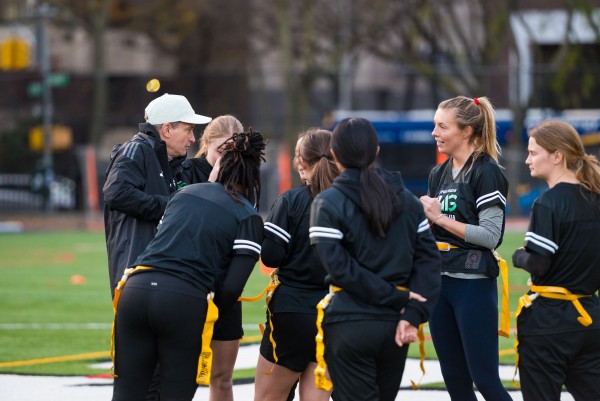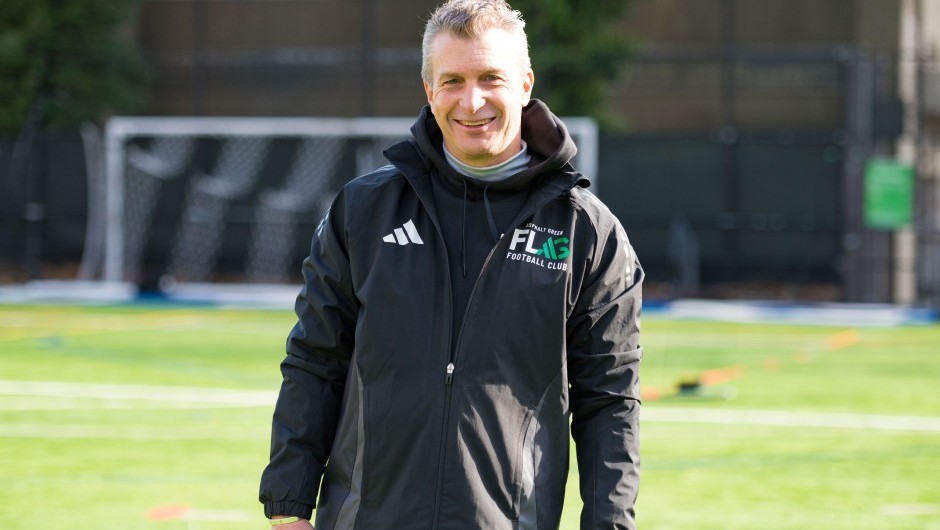On December 8, Asphalt Green celebrated the launch of its brand-new Flag Football Club with a 100% free, NFL-inspired Flag Football Combine, allowing hundreds of New Yorkers to test their athletic abilities and learn about the club.
The Flag Football Club will feature competitive women’s teams and an elite competitive women’s team for elite athletes ages 15 and older. The competitive teams will offer a holistic and innovative athletic development program that prepares athletes for competition, and a lifetime of healthy, active living. The Elite Women’s Team will offer selected athletes the opportunity to compete around the country and develop into players prepared to try out for Team USA’s Flag Football team ahead of the 2028 Olympic Games in Los Angeles!
Learn More About Asphalt Green's Flag Football Club
As the club kicks off, we were delighted to chat with the Club’s leader and head coach, Scott Lancaster, to talk about his decades of experience in elite sports at the National Football League, U.S. Soccer, Major League Soccer, and more, along with his vision for the Asphalt Green Flag Football Club.

We know you worked in developing sports programs for over 20 years, including at U.S. Soccer and the NFL, where you helped grow flag football around the country. I was hoping you could tell us a bit about your career and background in sports.
I’ve been involved in youth sports and professional sports for most of my career. That is a passion I’ve had forever as an athlete, then as a coach, and later in program development. Throughout my career, I’ve found that kids often lack age-appropriate programs, and girls don’t have programs designed specifically for them. Most sports programming is designed for boys or men. I decided to focus on creating programs tailored to girls to better suit their development.
What led you to want to bring your experience to Asphalt Green?
I worked at Asphalt Green before the pandemic, took a break, and then came back after working with high schools and the Philadelphia Union Soccer Club in Pennsylvania. I saw an opportunity to return to speed and agility training here. While working in Philadelphia, I saw how flag football was becoming a popular sport, especially amongst girls. I realized flag football could complement other sports like basketball and volleyball, and I wanted to bring that opportunity to Asphalt Green. Flag football is unique because it develops fundamental movement patterns like deceleration, acceleration, and change of direction. It incorporates vital athletic skills that are transferable to other sports.
Can you tell us a bit about how you aimed to grow flag football during your time with the NFL and what you see as the unique benefits of the sport for youth athletes?
Flag football was underdeveloped when I joined the NFL. My role was to broaden football participation, and I realized they were missing half the population by not including girls. Flag football offers safety and showcases athleticism. Girls find it appealing because of its focus on speed, agility, and change of direction. It’s also a natural fit for developing fundamental movement skills, which are often overlooked in youth sports. At Asphalt Green, we incorporate speed and agility training into our flag football curriculum to make athletes better across all sports.
We recently launched the Asphalt Green Flag Football Club. Can you provide a brief introduction to the club and share your goals for it?
.jpg)
The Asphalt Green Flag Football Club is modeled after the success of Asphalt Green’s Soccer Club and AGUA Swim Team. It includes a general club for girls and an elite division that will compete nationally and internationally. My goal is to develop athletes who could eventually compete in the Olympics. There’s a need to transform hybrid athletes into flag football players, and I believe Asphalt Green provides the facilities, training, and community to make that possible.
One of the program's goals is to prepare athletes for the 2028 Olympics, which will host the first-ever flag football competition. When did you decide to pursue this goal, and what’s the process for preparing athletes for that level of competition?
My interest in Olympic flag football started when I worked at the NFL, focusing on youth player development. Preparing athletes for the Olympics requires a strong foundation in movement skills, athletic conditioning, and a curriculum that builds these systematically over time. At Asphalt Green, we’re creating a pipeline for athletes to excel at this level, emphasizing both skill development and overall athletic performance.

